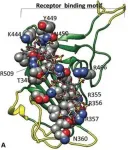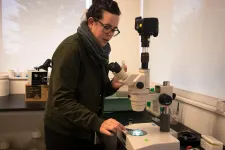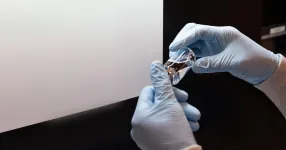Heparin targets coronavirus spike protein, research shows
Common anticoagulant drug could be repurposed for Covid-19 treatment
2021-01-28
(Press-News.org) An international team of researchers led by the Universities of Liverpool and Keele, working with Public Health England, has found that the common anticoagulant drug heparin inhibits the SARS-Cov2 virus spike protein, by reducing the virus' ability to attach to human cells and infect them.
The research, published in the journals British Journal of Pharmacology, and Thrombosis and Haemostasis, found that heparin interacts with the spike protein on the surface of coronavirus (SARS-CoV2), destabilising its structure and preventing it from docking with the ACE2 receptor on human cells.
Molecular modelling by collaborators at Queensland University in Australia showed how heparin can stick to the surface of the spike protein to achieve these effects, and studies with live SARS-CoV2 virus carried out at Public Health England's Porton Down laboratory showed that unfractionated heparin (but not low molecular weight heparins) could inhibit cell infectivity at doses similar to those currently used in clinical settings as an anticoagulant.
Crucially, the data strongly supported the clinical testing of inhaled ("nebulised") unfractionated heparin, since the doses known to be delivered to the lungs would have very strong anti-viral effects.
Professor Jeremy Turnbull from the Department of Biochemistry and Systems Biology at the University of Liverpool said: "This is exciting news since heparin could be rapidly repurposed to help alleviate Covid-19 infections, or possibly as a prophylactic treatment for high-risk groups such as medical staff or care workers. The results have also led us to investigate other novel compounds which mimic heparin that could potentially be effective against SARS-CoV2."
Dr Mark Skidmore from the School of Life Sciences at Keele University co-led the research. He said: "We also know that heparins inhibit a range of other viruses, so studying these drugs could provide new therapeutic strategies, and possibly a first-line of defence against emerging viral threats in the future, for example while vaccines are developed."
Professor Miles Carroll, of the National Infection Service, Public Health England added: "New treatments which target the SARS-CoV2 virus are urgently needed. Heparin, with its well-known clinical safety profile, is certainly an interesting candidate for repurposing against Covid-19."
"The Covid-19 pandemic has had a significant impact on the delivery of NHS services and local communities. These results strengthen the need for further investigation of heparin as a treatment in Covid-19 patients," said Dr Quentin Nunes, Consultant at the East Lancashire Hospitals NHS Trust, who is leading efforts to begin clinical trial of nebulised heparin in ITU patients in the UK.
The early release of preprint data from this study in March 2020, now published in peer-reviewed journals, has stimulated international efforts to explore the use of heparins for Covid-19 treatment. Further work is now ongoing to explore the potential of heparin and heparin-mimicking compounds as potential broad-spectrum antiviral drugs for Covid-19 and other emerging viral threats.
INFORMATION:
[Attachments] See images for this press release:

ELSE PRESS RELEASES FROM THIS DATE:
2021-01-28
The American lobster, which supports the most valuable fishery in North America, may be more susceptible to the effects of climate change than previously thought, according to a new study published in END ...
2021-01-28
EAST LANSING, Mich. - For Michigan State University's Felicia Wu, the surprise isn't that people who work with livestock are at higher risk of picking up antibiotic-resistant bacteria, but instead how much higher their risk levels are.
"This is a bit of a wakeup call," said Wu, John. A Hannah Distinguished Professor in the Departments of Food Science and Human Nutrition and Agricultural, Food and Resource Economics. "I don't think there was much awareness that swine workers are at such high risk, for example. Or that large animal vets are also at extremely high risk."
Compared with individuals who don't work with animals, those working on swine farms are more than 15 times more likely to harbor a particular strain of a bacterium known as methicillin-resistant ...
2021-01-28
The increased global use of antiviral and antiretroviral medication could have a detrimental impact on crops and potentially heighten resistance to their effects, new research has suggested.
Scientists from the UK and Kenya found that lettuce plants exposed to a higher concentration of four commonly-used drugs could be more than a third smaller in biomass than those grown in a drug-free environment.
They also examined how the chemicals transferred throughout the crop and found that, in some cases, concentrations were as strong in the leaves as they were in the roots.
The study - published in Science of the Total Environment - was conducted by environmental chemists from the University of Plymouth (UK), Kisii University (Kenya) and ...
2021-01-28
An international team of researchers has characterized the effect and molecular mechanisms of an amino acid change in the SARS-CoV-2 Spike protein N439K. Viruses with this mutation are both common and rapidly spreading around the globe. The peer reviewed version of the study appears January 25 in the journal Cell.
Investigators found that viruses carrying this mutation are similar to the wild-type virus in their virulence and ability to spread but can bind to the human angiotensin converting enzyme 2 (ACE2) receptor more strongly. Importantly, researchers show that this mutation confers resistance to some individual's serum antibodies and against many neutralizing monoclonal antibodies, including one that is part of a treatment authorized for emergency use by the U.S. ...
2021-01-28
The multidisciplinary research group Lactiker - Quality and Safety of Foods from Animal Origin, which is attached to the University of the Basque Country (UPV/EHU), is working on (among other things) characterising the biochemical, microbiological and technological processes involved in cheese manufacturing that have a direct impact on its technological, nutritional and sensory quality, as well as on its food safety status. The aim is to provide the cheesemaking industry with the information it requires to ensure safe, high-quality products.
The group, which has been working in this field for 25 years, has conducted studies focusing on all aspects of the production of cheeses under the Idiazabal Protected Designation of Origin ...
2021-01-28
More effective antiviral treatments could be on the way after research from The University of Texas at Austin sheds new light on the COVID-19 antiviral drug remdesivir, the only treatment of its kind currently approved in the U.S. for the coronavirus.
The study is END ...
2021-01-28
BOSTON - Investments in infrastructure to promote bicycling and walking could save as many as 770 lives and $7.6 billion each year across 12 northeastern states and the District of Columbia under the proposed Transportation and Climate Initiative (TCI), according to a new Boston University School of Public Health (BUSPH) and Harvard T.H. Chan School of Public Health study.
Published in the Journal of Urban Health, the analysis shows that the monetary benefit of lives saved from increased walking and cycling far exceed the estimated annual investment for such infrastructure, without ...
2021-01-28
DURHAM, N.C. -- Malaria is an ancient scourge, but it's still leaving its mark on the human genome. And now, researchers have uncovered recent traces of adaptation to malaria in the DNA of people from Cabo Verde, an island nation off the African coast.
An archipelago of ten islands in the Atlantic Ocean some 385 miles offshore from Senegal, Cabo Verde was uninhabited until the mid-1400s, when it was colonized by Portuguese sailors who brought enslaved Africans with them and forced them to work the land.
The Africans who were forcibly brought to Cabo Verde carried ...
2021-01-28
CHAPEL HILL, NC - Many molecules in our bodies help our immune system keep us healthy without overreacting so much that our immune cells cause problems, such as autoimmune diseases. One molecule, called AIM2, is part of our innate immunity - a defense system established since birth - to fight pathogens and keep us healthy. But little was known about AIM2's contribution to T cell adaptive immunity - defenses developed in response to particular pathogens and health problems we develop over the course of our lives.
Now, UNC School of Medicine scientists led by Jenny Ting, PhD, the William Kenan Distinguished Professor of Genetics, and Yisong Wan, PhD, professor of microbiology and immunology, discovered that AIM2 is important for the proper function of regulatory ...
2021-01-28
DURHAM, N.C. -- When their manhood is threatened, some men respond aggressively, but not all. New research from Duke University suggests who may be most triggered by such threats - younger men whose sense of masculinity depends heavily on other people's opinions.
"Our results suggest that the more social pressure a man feels to be masculine, the more aggressive he may be," said Adam Stanaland, a Ph.D. candidate in psychology and public policy at Duke and the study's lead author.
"When those men feel they are not living up to strict gender norms, they may feel the need to act aggressively to prove their manhood -- to 'be a man'."
The pair of studies considered 195 undergraduate students and a random pool of 391 men ages 18 to 56.
Study participants were asked a series ...
LAST 30 PRESS RELEASES:
[Press-News.org] Heparin targets coronavirus spike protein, research shows
Common anticoagulant drug could be repurposed for Covid-19 treatment



